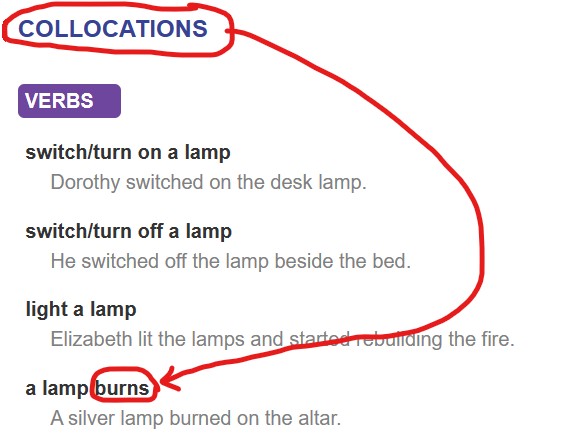5 keep the lamp burning与keep the lamp being on
When we got back from the cinema, we found the lamp ____ but the door ____.
A. being on, shut
B. burning, shutting
C. burning, shut
D. on, shutting
这道题答案是C。想问下第一格being on或者单独的on可以填吗?A选项为什么不对呢?
最佳答案 2024-08-01 07:30
再次查阅了一下朗文和牛津词典,两本词典对find一词的用法解释基本相似,观察所列举的用法条目,似乎可以找到一些思路。
1.《朗文高级英语词典》对find一词的释义及例句:
to discover that someone or something is in a particular condition or doing a particular thing when you see or touch them.
1) find somebody/something+adjective
I’m sure we’ll find her hard at work when we get home.
He tried the door and found it unlocked.
2) find somebody+prepositional phrase
She woke to find a man by her bed.
3) find somebody/something doing something
Often he found her quietly weeping alone.
4) find (that)
She looked at her glass and was amazed to find it was empty.
2.《牛津高阶英语词典》(纸质第9版) find词条7(为简练计,只列举用法条目,不列举例句):
1) find sb/sth/yourself+adv./prep.
2) find sb/sth/yourself+adj.
3) find sb/sth/yourself doing sth
4) find (that)…
通过对朗文和牛津词典的例句观察,find sb/sth+adj./adverb/prepositional phrase/doing应该可以和find (that)进行同义转换,用that从句体现出一般体意义和进行体意义,或者静态意义和动态意义。以朗文词典的例句为例,应该可以这样:
1) I’m sure we’ll find (that) she is hard at work when we get home.
2) He tried the door and found (that) it was unlocked.
3) She woke to find (that) a man was by her bed.
4) Often he found (that) she was quietly weeping alone.
5) She looked at her glass and was amazed to find it empty.
如果按照这个思路解释:
C项:we found the lamp burning but the door shut.
可以转换为:
We found (that) the lamp was burning but the door was shut.
A项:we found the lamp being on but the door shut.
会转换为:
We found (that) the lamp was being on but the door was shut.(恐怕不能成立)
所以,倾向于选择C项,不选A项。
个人理解,未必正确,仅供参考。
其它 4 个回答
两位老师都做了精彩的解答。我这里从考试的角度补充一下这道题为什么答案是C。因为要贴图,所以开贴回答。
既然是考题,就要从考试(textbook)而非实际(real life)的角度出发来考虑,也就是所谓的考点。这里涉及两个方面:
1) 考察find的使用—如果是“主谓宾宾补”的句型(SVOOC),有四个使役动词充当谓语动词的话,宾补有动词的话,要使用该动词的分词形式,也就是在Ving和Ved两种形式种选一个,主动用Ving,被动用Ved。find就是四大之一,也就是说,考试时,你根本不用去看懂整个句子,发现谓语动词是find,而宾补要选一个动词,你直接根据主/被动,在选项中找-ing或ed形式的动词就ok,所以从形式上,D选项就可排除(因为on);
2)习惯搭配。也就是所谓的collocation。与lamp搭配的常用动词是burn,而且用主动而非被动(be burned)形式,所以宾补选burning (这也是为什么不选A,因为being是多余的)。而门关上了,当然用被动,所以宾补用shut(此处shut不是动词原形,而是shut的过去分词)

以上是基于考试做的分析,脱离考试这个范畴,我的解答可以直接忽略
一家之言,仅供参考;
勤查英英,必有所获!
- 4 关注
- 0 收藏,2784 浏览
- 灰灰 提出于 2024-05-10 10:12
相似问题
- including that是现在分词充当连词引导从句吗 1 回答
- 现在分词的成分 2 回答
- 用doing+sth和to do 有什么区别 1 回答
- 这个句子中为什么control用doing的形式 1 回答
- doing的成分 2 回答
- It's worth后面为什么接动名词不接不定式 1 回答
-
 《高考英语备考1号·速效编》
《高考英语备考1号·速效编》
-
 《高考英语备考1号·写作编》
《高考英语备考1号·写作编》
-
 《高中英语晨读晚记》
《高中英语晨读晚记》
-
 《高中英语错题笔记》
《高中英语错题笔记》
-
 《零起点考大学英语》
《零起点考大学英语》
-

